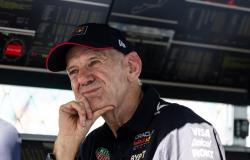Seventeen people were arrested and presented to the public by the Bolivian police on Thursday June 27, 2024.
AFP
Bolivian authorities paraded handcuffed detainees in front of the media on Thursday, announcing 17 arrests in the wake of the failed coup in a country gripped by a serious economic crisis.
The institutional storm blew only a few hours, but enough to reveal the country’s fragility as appetites whetted for the 2025 presidential election. The motivations of the head of the army, Juan José Zuniga, who had deployed men and armored vehicles on Murillo Square, opposite Parliament and the presidential palace, remain unclear.
Before his arrest by the police, then that of the head of the Navy, Juan Arnez Salvador – the two men are being prosecuted for “armed uprising and terrorism” and face up to twenty years in prison – General Zuniga had said he wanted “restructuring democracy, making it a real democracy (…) Not that of a few, not that of a few masters who have ruled the country for thirty or forty years.”
“Planned since May”
He also claimed to have acted on orders from the head of state who asked him to “stage something to increase his popularity”. President Arce, degrading General Zuniga and swearing in a new command of the armed forces on Wednesday, affirmed on the contrary that it is an “attempted coup d’état by soldiers who soil the uniform” .
His Minister of Government (Interior), Eduardo Del Castillo, castigated “two putschist soldiers who wanted to destroy democracy”. On Thursday, he presented to the media 15 other people arrested, handcuffed, surrounded by police. “This operation had been planned since May,” he said, adding that three other suspects were being sought.
According to Eduardo del Castillo, the plan to overthrow Luis Arce “was led by Juan José Zuniga and Juan Arnez.” The United Nations on Thursday called for “a thorough and impartial investigation into the allegations of violence.”
“It’s an order”
Although the institutional order has only slightly wavered, strong images remain. That of a door to the presidential palace forced open by an armoured vehicle and the entry into the crowd of General Zuniga, the securing of the square and the firing of tear gas by the military, injuring eight people, and the images of the conversation between Luis Arce and Juan José Zuniga, broadcast by the presidency.
“I am your captain (…) take all the military police back to their barracks (…) withdraw all these forces now. This is a general order, you are not going to listen to me?” President Arce then reprimands. The general looks at him and answers with a categorical “no”.
After the military withdrew from Murillo Square, President Arce appeared on the balcony of the presidential palace to greet the crowd that had gathered there. “No one can take away the democracy we have won,” he chanted. Condemnations of General Zuniga’s actions have poured in from all South American countries, as well as from Spain, France and the United States.
Russia, which had received Luis Arce, a rare visit by a foreign head of state to the country since the outbreak of the conflict with Ukraine in February 2022, underlined Thursday its “solidarity with Bolivia, a brother country and a reliable and strategic partner,” according to Russian Foreign Minister Sergei Lavrov.
Economic crisis and political quarrels
But for Gustavo Flores-Macias, from Cornell University in the United States, “the fact that the coup failed does not mean that the situation in Bolivia is resolved, on the contrary: it was a symptom of a very important discontent that exists in broad sectors.”
Because this episode occurs in a context of strong economic turbulence caused by the fall in revenues due to the low production of gas, its main source of foreign currency until 2023, a surge in prices and a scarcity of dollars provoking the anger of traders of all kinds, while a fuel shortage stretches the queues in front of gas stations.
And above all in the background is the conflict between Luis Arce and his political mentor, former president Evo Morales (2006-2019), both of whom are keen to run on behalf of the ruling party, the Movement Towards Socialism (MAS), in the 2025 presidential election.
(AFP)







